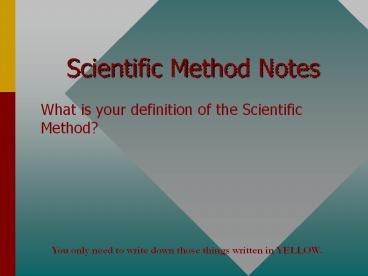Scientific Method Notes - PowerPoint PPT Presentation
Title:
Scientific Method Notes
Description:
Scientific Method Notes What is your definition of the Scientific Method? You only need to write down those things written in YELLOW. The Scientific Method is An ... – PowerPoint PPT presentation
Number of Views:369
Avg rating:3.0/5.0
Title: Scientific Method Notes
1
Scientific Method
Notes
What is your definition of the Scientific Method?
You only need to write down those things written
in YELLOW.
2
The Scientific Method is
- An organized process to collect information and
solve problems
3
Ask a question
- 1A. Make an Observation
- Observation - What you see, smell, taste, feel or
hear - - Must be factual detailed.
- - Interpretation - Judgment on an observation
4
1B. Identify the Problem
- What do you want to know?
- Why are you doing this?
- What is wrong?
- What are you trying to understand?
5
1C. Research your Observations
- Collect information
- Find out what other people already know.
- Can you save some work and time?
- Has someone else done your experiment before?
- Can you stop from making the same mistakes
someone else has already made? - Dont forget to list your resources! (GOOGLE is
NOT a source!)
6
2. Form a Hypothesis
- A hypothesis is a testable statement.
- Often called an educated guess, it is a possible
solution to your problem. - It is OKAY if your experiment shows that your
hypothesis is rejected.
7
3. Design/Conduct an Experiment
- Your experiment must be testing the hypothesis.
- All of the parts of the experiment must be in the
experimental design. - The experimental design should be clear enough
for other scientists to reproduce.
8
- You may or may not conduct a controlled
experiment - Controlled- Everything is the same except for the
independent variable. - Not controlled- (without experimentation)
- Field research
- Human subjects if the control would be
impractical or unethical
9
- Parts of a controlled experiment
- Constants things that are the same in all of the
groups - Independent variable a change the experimenter
controls - Dependent variable changes the scientist
measures during the experiment - Experimental group group that receives the
independent variable (change) - Control group group that is the norm does
NOT receive the independent variable
10
4. Collect and Analyze Data
- What kinds of results do you need to record?
- Quantitative - number data
- ex. 23 cm, 6 g
- Qualitative - word data
- ex. red, smooth
11
Analyze the Results
- How do you organize you results?
- - Look at the data. Does it make sense? Did you
follow your procedure? - - Organize it. Table? Graph? Paragraph?
- Do you see a pattern?
TIP Do you need to do any calculations?
Check your math.
12
5. Draw (make) Conclusions
- A hypothesis is never proven.
- Does your data support or reject your
hypothesis? - Support the hypothesis is correct
- Reject the hypothesis is wrong
- If your hypothesis was rejected, make a new one
and start over again. - Did anything go wrong?
- Could your experiment be improved?
13
6. Share Results
- Reports
- Record all of the details of your
experiment. - If any other scientist follows you
experiment, they should get the same
results. - Include any new information that was found
or discovered in your experiment. - Include suggestions for improvement or areas
where your experiment can be improved. - _Consider bias. What are some examples of bias
in a scientific study?































